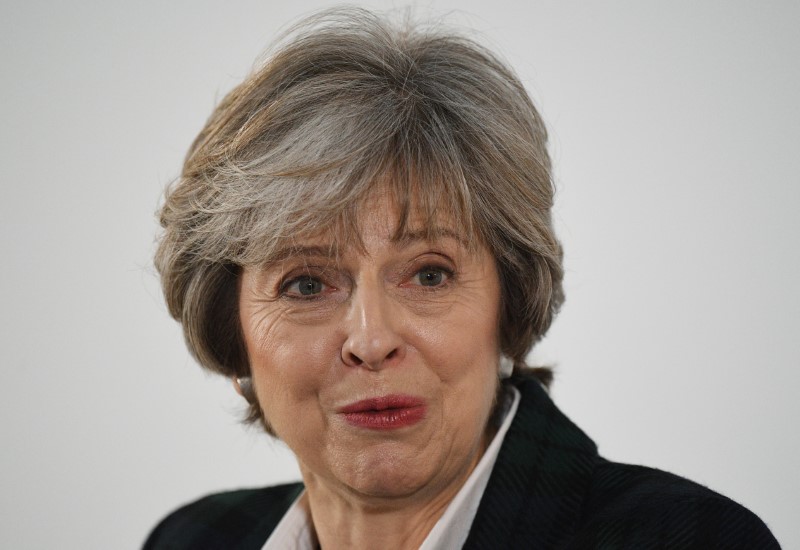By Philip Blenkinsop
BRUSSELS (Reuters) - British Prime Minister Theresa May was clear on Tuesday that Britain would leave the EU's single market, but her desire for a customs agreement with the bloc highlights one of the Brexit cliff edges UK-based industry is seeking to avoid.
May said she wanted Britain to be able to strike trade pacts with countries such as the United States, Australia, New Zealand and China and acknowledged that "full" membership of the customs union would prevent it from doing so.
"But I do want us to have a customs agreement with the EU," she said, adding Britain might seek to become an associate member of the existing customs union or a signatory to some elements of it.
The European Union shares a customs union with Turkey, allowing industrial goods to move freely without customs duties or other restrictions, but forcing Ankara to accept the terms the EU agrees in free trade deals with third countries.
With a free trade deal, Britain might avoid the standard EU import tariffs, such as 10 percent for cars, but without a customs agreement it would face having to prove its exported products are indeed British.
In the case of a car, with say 30,000 parts, the task of proving sufficient local content is enormous for manufacturers.
"It's variable, but the increased cost could be as high as 10 percent," Jim Rollo, deputy director of the UK Trade Policy Observatory, said of the financial impact of that task.
CONSIDER RELOCATING
Hosuk Lee-Makiyama, director of trade policy think tank ECIPE, said the extra cost involved with customs barriers could be the final step in the de-industrialization of Britain.
"They're going to consider shutting the factory. Most of manufacturing industry has profit margins much less than 10 percent, and would have to consider relocating to the EU or Turkey," he said.
In a letter to Britain and the EU in September, Japan outlined concerns expressed by Japanese businesses, many of them such as Nissan (T:7201), Hitachi (T:6501) or Fujitsu (T:6702) with European operations concentrated in Britain.
One specific worry was possible changes to customs clearance procedures and the introduction of "inconvenient" rules of origin that could lead to delays and increased costs.
The head of the UK car industry body said on Tuesday that British-built cars may not comply with the local content criteria set down in the average free-trade deal.
The customs union is highly valued by the car industry as nearly 60 percent of the parts in an average British-assembled car are made abroad and some components travel to and from the continent several times in the manufacturing process.
Whether a partial or associate customs union membership is possible or practical is not clear - Brexit being new territory for all parties.
Rollo believes sectoral carve-outs could raise hackles with fellow World Trade Organization members and a customs agreement, which might be overseen by a supranational court, might be a hard sell to hard core Brexit backers.
TWO YEARS?
Apart from cost, the time frame is also a nagging concern for some.
May's goal is to wrap up a new trading arrangement in two years, far faster than any trade deal the EU has ever negotiated.
Britain's former top diplomat to the EU in Brussels said in December it might take a decade to secure a new deal. Austria's finance minister forecast on Tuesday a period of five years.
EU negotiations with Canada lasted just over five years, but the deal is still not in place more than two years later.
Britain's Brexit minister David Davis told parliament on Tuesday that Britain was at a different starting point as it already has the same standards of production as the EU and no existing customs barriers.
The European Commission, which negotiates trade pacts on behalf of EU members, has also expressed frustration with plodding pace on other deals.
Commission President Jean-Claude Juncker last week told New Zealand Prime Minister Bill English that planned trade talks could be wrapped up much quicker than normal.
"Normally it takes between five, six, 10 years. I think two or three years would be enough because we have very similar situations. We are friends, we are allies," he said.

Friends and allies - would he say the same of Britain?